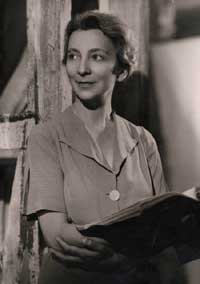Leontine Sagan facts for kids
Quick facts for kids
Leontine Sagan
|
|
|---|---|
 |
|
| Born |
Leontine Schlesinger
13 February 1889 |
| Died | 20 May 1974 (aged 85) |
| Occupation | Theatre director and actress |
| Spouse(s) | Victor Fleischer |
Leontine Sagan (born Leontine Schlesinger; 13 February 1889 – 20 May 1974) was an Austrian-Hungarian theatre director and actress of Jewish descent. She is best known for directing Mädchen in Uniform (1931).
Along with directing for both cinema and the stage, Sagan also acted in several films. She died in Pretoria, South Africa in 1974, at the age of 85.
Contents
Personal life
Born in either Budapest or Vienna in 1889, Sagan trained with Max Reinhardt, who is best known for his elaborate and imaginative sets and theatrics. In 1899, as a child, she moved to South Africa with her family just before the Second Boer War. She was educated in a German-language school in Johannesburg. In her later years, Sagan married publisher and writer Dr. Victor Fleischer; the union was childless.
Career
Sagan directed three films. She is best remembered for the first of two films she directed, Mädchen in Uniform (1931). It has an all-female cast and was ground-breaking not only for its portrayal of lesbian and pedagogical eros, but also for the production's co-operative and profit-sharing financial arrangements. Whether Sagan herself was a lesbian is unknown; the book Women Film Directors lists her as "lesbian film director" as she directed Christa Winsloe's play, said to contain lesbian themes.
In her teenage years, she worked as a stage actress in Germany and Austria. Some films that Sagan appeared in include The Holy Mountain (1926), The Great Leap (1927), The White Ecstasy (1930), and Die Nacht der Regisseure (1994). It was not until 1931, when Sagan became involved behind the scenes, that she gained international attention after directing her most significant film Mädchen in Uniform.
Following the debut of this film, Sagan moved to England. In England, she directed Men of Tomorrow and worked for the film director Alexander Korda at Korda’s Studios. She later worked as a theatre producer in Manchester. She was also the first female producer at London's Drury Lane, where she successfully presided over a series of Ivor Novello's musicals in the West End: Glamorous Night (1935), Careless Rapture (1936), Crest of the Wave (1937), The Dancing Years (1939) and Arc de Triomphe (1943). The popularity of these shows is credited with saving Drury Lane from potential closure in the 1930s. Towards the end of her career, Sagan moved to South Africa and became an influential director in South African theatre, and co-founded the National Theatre in Johannesburg. In February 1948 she directed the NTO's first English production Dear Brutus by J.M. Barrie, followed by An Inspector Calls. Directed In Theatre Street for the East Rand Theatre Club in 1950. (Leontine Sagan - ESAT. N.p., n.d. Web. 12 Dec. 2016.)
Books
- Lights and Shadows: The autobiography of Leontine Sagan, Johannesburg 1996
- Michael Eckardt (ed.): Leontine Sagan. Licht und Schatten. Schauspielerin und Regisseurin auf vier Kontinenten. Hentrich & Hentrich, Berlin 2010, ISBN: 978-3-941450-12-7.
See also
 In Spanish: Leontine Sagan para niños
In Spanish: Leontine Sagan para niños
 | Georgia Louise Harris Brown |
 | Julian Abele |
 | Norma Merrick Sklarek |
 | William Sidney Pittman |

